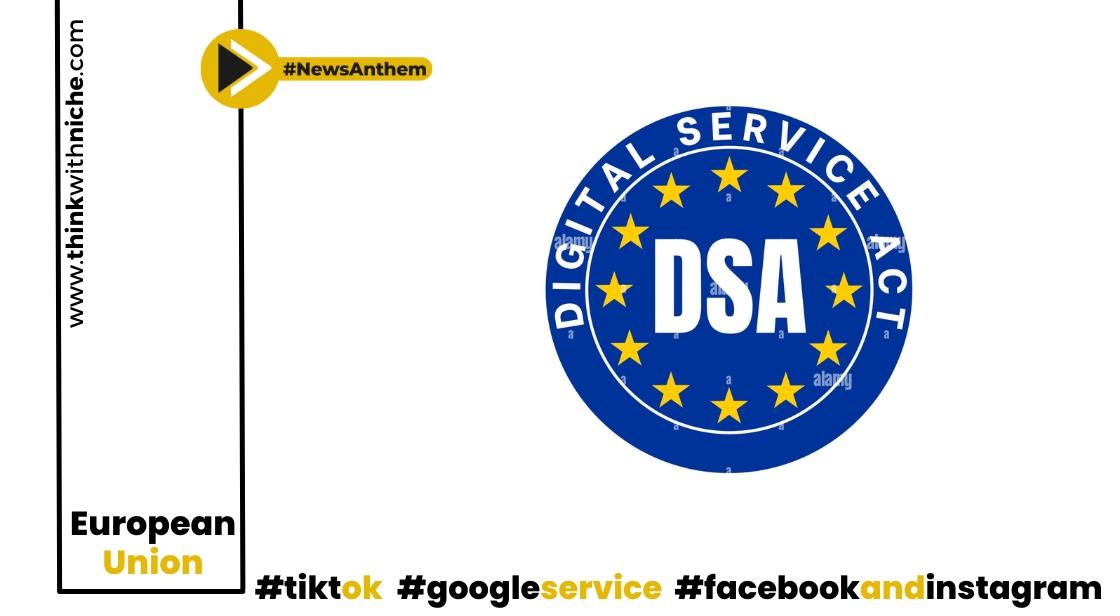Big Tech Giants Confront Implementation of European Union's Digital Services Act

News Synopsis
The European Union's groundbreaking Digital Services Act (DSA) is ushering in an era of increased legal scrutiny for more than a dozen global tech giants.
As the DSA rolls out this month, these industry leaders, including Meta's Facebook and Instagram, TikTok, and Google services, are facing unprecedented obligations related to content moderation, user privacy, and transparency.
The Scope of the Digital Services Act:
The DSA's comprehensive provisions encompass a range of critical areas, from curbing the spread of harmful content to limiting user-targeting practices.
These tech companies are now required to share internal data with regulators and associated researchers, a significant departure from previous practices. The DSA applies initially to 19 of the largest online platforms with over 45 million users in the EU.
However, from mid-February, its rules will encompass various online platforms, irrespective of their size.
Potential Impact of the DSA:
The European Union is at the forefront of global tech regulation, evidenced by the DSA, along with impending legislation like the Digital Markets Act and the AI Act.
The efficacy of implementing such regulations within the EU will likely influence the adoption of similar rules worldwide. However, concerns have arisen among researchers about whether these tech giants have adequately met the expectations set by lawmakers.
Navigating Compliance and Challenges:
Failure to comply with the DSA carries substantial consequences, with potential fines reaching up to 6% of a company's global turnover. Repeat offenders even risk being banned from operating in Europe altogether. In response to the DSA, some of the designated companies have made public statements via blog posts, but their level of compliance remains a topic of scrutiny. Notably, e-commerce giant Amazon and German fashion retailer Zalando are challenging their inclusion on the list in court, suggesting that companies may vigorously defend their practices.
Stress Tests and Preparation:
The European Commission has conducted "stress tests" with the 19 platforms designated under the DSA. These tests assessed the platforms' ability to detect and mitigate systemic risks such as disinformation. Among the platforms that participated in these tests were Facebook, Instagram, Twitter, TikTok, and Snapchat. The Commission noted that additional efforts are required to adequately prepare for the DSA's requirements.
Content Moderation Challenges Persist:
Despite ongoing preparations, recent research by nonprofit organization Eko has unveiled gaps in content moderation efforts. The research demonstrated that Facebook approved online ads containing harmful content, including calls for violence and hate speech.
Similarly, Global Witness reported instances where platforms like Facebook, TikTok, and YouTube approved ads inciting violence against the LGBT community. These revelations highlight the complexities of enforcing stringent content moderation measures.
Tech Giants' Responses and Legal Challenges:
In response to these findings, Meta (formerly Facebook) emphasized that the research was based on a limited sample of ads and not reflective of their daily ad review process. Amidst the evolving landscape, Amazon and Zalando have contested their inclusion under the DSA.
Amazon's legal challenge is based on the assertion that larger competitors have not been subjected to the same designation. Zalando similarly challenges its inclusion due to the user threshold criteria.
Anticipating the Path Forward:
As the DSA takes effect and the regulatory environment evolves, it remains to be seen how well the designated companies align with the law's requirements. Industry observers, like Kingsley Hayes, anticipate that companies will face challenges in reconciling these obligations with their core business models.
The coming months will likely reveal whether these tech giants effectively navigate the intricate landscape of compliance and user protection in the digital sphere.
Some relevant and latest facts for the above news article:
-
The Digital Services Act (DSA) was adopted by the European Parliament and the Council of the European Union in July 2022. It will come into force on January 1, 2024.
-
The DSA applies to online platforms with more than 45 million users in the EU. These platforms will be required to take more responsibility for the content that is hosted on their platforms. This includes preventing harmful content from spreading, banning or limiting certain user-targeting practices, and sharing some internal data with regulators and researchers.
-
The DSA has been praised by some for its potential to hold tech companies accountable for the content that is hosted on their platforms. However, others have raised concerns that the DSA could stifle innovation and free speech.
-
It is still too early to say how tech companies will comply with the DSA. Some companies have already made changes to their policies and practices in anticipation of the new rules. However, others are still trying to figure out how to comply.
-
The DSA is a landmark piece of legislation that could have a significant impact on the way that online platforms operate. It remains to be seen how effectively the DSA will be enforced and how it will be ultimately implemented.
Here are some additional facts that may be relevant:
-
The DSA is part of a broader effort by the European Union to regulate tech companies. In December 2020, the EU also adopted the Digital Markets Act (DMA), which is designed to rein in the power of tech giants such as Google and Amazon.
-
The DSA and DMA are the first major pieces of legislation in the world that are specifically designed to regulate tech companies. They are expected to have a significant impact on the way that these companies operate, both in the EU and around the world.
-
The DSA and DMA have been met with mixed reactions from tech companies. Some companies have welcomed the new rules, arguing that they will help to create a fairer and more competitive online marketplace. Others have criticized the rules, arguing that they are too burdensome and will stifle innovation.
-
It remains to be seen how the DSA and DMA will be implemented and enforced. However, they are likely to have a significant impact on the way that tech companies operate in the years to come.









